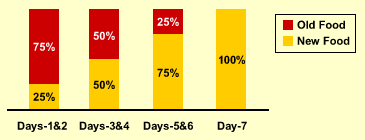QuestionGood evening... Last week, I adopted a four month old terrier mix female from the local animal control. I took her directly to my vet for an exam and to discuss her longterm care; shots, food options, etc. She was healthy. 2 days later, my dog started displaying signs of possible kennel cough. Over the weekend, her symptoms became more pronounced. Coughing, watering eyes, sneezing, so I contacted my vet. He prescribed Baytril. 22.7 mg to be administered 2x daily. My dog weighs 8 pounds. My concern now is that a lot of the research I've just done on this med specifically states that prescribing for a growing dog less than 1 year old is not advised as there is risk of developing cartilage lesions. I have the utmost respect for my vet, and would not wish to purposely question his treatment decision for "Dyna", but I can tell you that only within one week, I'm pretty attached to her and am concerned giving her a drug for 10 days with obvious risks. Any help is greatly appreciated.
AnswerKennel cough is a self limiting disease- on other words the dog usually gets over it on their own- however the antibitoics are given to prevent secondary infections and pneumonia.
Baytril is a different kind of antibiotic than the usual kind.
Doing some research myself, this is what I read:
Fluoroquinolones act by deactivating bacterial enzymes necessary for the transcription of DNA. DNA is very tightly coiled in order to fit inside a cell. Segments to be used must be uncoiled by an enzyme called DNA gyrase. The fluoroquinolone antibiotic deactivates DNA gyrase making the reading of DNA impossible. The bacterial cell dies. Mammalian DNA gyrase is of a completely different shape and remains unharmed.
SIDE EFFECTS
At approximately ten times the recommended dose vomiting and diarrhea may be seen with this medication. At normal doses, this should not be seen. Dogs with Pseudomonas ear infections require very high doses of enrofloxacin and nausea may indeed become a problem.
In immature dogs (less than 8 months of age) damage to joint cartilage can occur. This phenomenon is only seen in growing dogs and does not seem to be a problem in cats.
It is preferable not to use this medication in puppies unless the severity of the infection present warrants it.
The use of enrofloxacin can produce crystals in urine. These crystals may show up on a laboratory test thus it is important to be aware of this side effect. Enrofloxacin crystals should not be confused with more clinically relevant struvite, oxalate, or urate crystals.
So if your vet is concerned about Pseudomonas, then I can see him using this drug. If I were you I would call and ask the technician to ask the vet if there is a safer drug that you can switch to as you have these valid concerns.
I am sure this side effect is very rare. I have never seen it and we used this drugs for the last 20 yrs.
But that doesn't mean it can't happen and when it's your puppy, you want the best for her.
So call the vet tomorrow and talk to the technician. That's what we are there for!!
I hope your dog has a speedy recovery.

 using Sevin 10 dust around indoor cat?
QuestionHave killed fleas off animals but now fleas in
using Sevin 10 dust around indoor cat?
QuestionHave killed fleas off animals but now fleas in
 Black spots on belly
Question
Spots
My 4 month old pit bull mix has t
Black spots on belly
Question
Spots
My 4 month old pit bull mix has t
 My 5 month old Labrador blad spot
QuestionBald spot on neck
Bald spot on leg
My 5 month old Labrador blad spot
QuestionBald spot on neck
Bald spot on leg
 Red Spot at Snout
Question
Red Sore
Me & my boyfriend have 3 dogs,
Red Spot at Snout
Question
Red Sore
Me & my boyfriend have 3 dogs,
 kitten with bloody stool
QuestionQUESTION: i have a kitten here, about 2-3 month
kitten with bloody stool
QuestionQUESTION: i have a kitten here, about 2-3 month